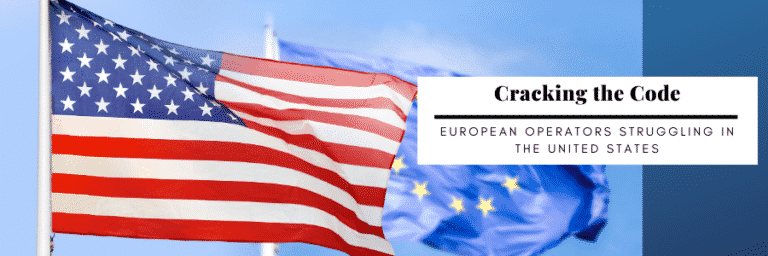Opinion: There Is No Right Way To Legalize Sports Betting

If you’ve spent any time following the coverage of legal sports betting, you know there’s no shortage of debate when it comes to the rollout of sports betting across the country.
Whether it’s a state:
- awarding a monopoly,
- imposing high sports betting tax rates and licensing fees,
- eschewing mobile betting, or
- requiring in-person registration,
the calls of, “It’s bad for the market,” and “It’s a gift to illegal, offshore sites,” quickly follow. These criticisms are usually punctuated with a condescending “lol. You’re doing it wrong.”
Different Strokes For Different Folks
The criticisms assume the state’s goals, and the goals of operators, ancillary suppliers/vendors, affiliates, and the bettors are aligned. They’re not.
Setting aside what is mainly lip service about consumer protections and stamping out the black market:
- Operators are interested in market conditions that will drive profits and increase individual market share.
- Ancillary suppliers/vendors are interested in increasing their presence and showcasing their products to attract new partners.
- Affiliates favor an open, highly competitive market that helps them leverage higher CPAs.
- Bettors want the same thing as affiliates, but for a different reason. A consumer-friendly market means better odds and promotions.
- And then there’s the state, whose primary motivation is tax revenue.
Looking Out For Number One
Of course, when it comes to complex issues, the primary motivation isn’t the only consideration, but when push comes to shove, the above list is a good representation of each group’s ultimate goal.
If you need proof of the “take care of number one” attitude, look no further than DraftKings’ bipolar stance in two monopoly jurisdictions, Washington DC and New Hampshire. Spoiler alert: DraftKings has an online monopoly in one of these states.
And that is just one example. I could produce a long list that shows the self-interests of each of the above-listed entities.
Notice there are only faint grumblings coming from the above when it comes to the lack of responsible gaming policies and problem gambling funding in these bills. While everyone argues about percentages of a tax rate, integrity fees, and so on, the high cost of mitigating the harms of problem gambling goes largely unfunded and is left to the states – bankruptcies, missed work, treatment, crime, and on and on.
With that in mind, take these criticisms for what they are.
Understand that many media outlets double as affiliates (including this one) and are financially tied to signing up online customers. They have a vested interest in the policies a state adopts and aren’t overly interested in an operator’s profits or the tax revenue a state receives.
To be clear, I’m all for the legalization of online gambling, and I’m against in-person registration requirements. I don’t think monopolies or burdensome operating costs are the best approaches. At the same time, I disagree with the notion that states need to legalize sports betting the way I would, or that they need to rush into online gambling.
State lawmakers need to do what they believe is best for the state, with some consideration of what is best for operators and bettors.
Bottom line: It all comes down to what the state feels is important. And to some extent, it also depends on who is calling the shots.
The Pennsylvania Conundrum
At G2E, former New Jersey Governor Chris Christie called the Pennsylvania sports betting industry a “rolling dumpster fire.” During his address, Christie scoffed at the Keystone State’s high tax rate and licensing fees and pointed to the superior performance of New Jersey as evidence of how to get sports betting right.
But to paraphrase Obi-Wan Kenobi, “that’s only true from a certain point of view.”
The New Jersey perspective is, “we’re taking more bets and generating a lot more revenue than Pennsylvania, so our policies are superior.”
The Pennsylvania perspective is, “good for you, but even though we’re generating significantly less revenue, we’re collecting more tax revenue.”

At the end of the day, it comes down to what your goals are.
But How Much Does It Cost?
Another factor to consider is cost.
As Delaware Lottery Head Vernon Kirk recently told USBets.com, “There are also substantial additional costs associated with mobile that we are not currently incurring (i.e. geolocation, ID verification, payment vendors & processors, 24/7 customer support, fraud monitoring, mobile platform fees, etc.).”
So, the notion that every state should jump headfirst into mobile may not be correct. Mobile betting might be too costly for small population states like Delaware, states where the addition of mobile would require the hiring and training of regulators and staff, and in states where swathes of land need to be geofenced.
A great example of the cost can be seen in the recently revealed figures from DraftKings and FanDuel, arguably the two most successful US sports betting operators thus far.
In an SEC report filed as part of its effort to acquire SBTech, DraftKings reported losses of $114 million through the first three quarters of 2019.
FanDuel’s parent company, Flutter anticipates 2019 losses of more than $50 million in the US.
Benefits Beyond Direct Revenue
Further, some of the people trumpeting their vision of the ideal sports betting industry are being disingenuous and playing loose with the numbers.
Direct revenue numbers are but a single piece of a much larger puzzle. Fixating on the gap between retail and online sports betting revenue is akin to comparing the food sales at two restaurants without considering other revenue streams the businesses might have, be it liquor sales or entertainment.
I’m not arguing that retail betting is more important or better than online betting. I’m simply pushing back against the notion that sports betting’s impact is measured solely by direct revenue, and if a state foregoes online betting, it’s making the worst kind of blunder.
Both online and retail betting possess benefits that go far beyond direct revenue.
The Ancillary Benefits of Online Sports Betting
The economic impact of online betting goes far beyond its direct revenue numbers. In a recent report, iDEA Growth highlighted that the economic output of New Jersey’s online casino industry was double the $1 billion in direct revenue it generated, about $2 billion total.
So like land-based gaming, online gaming provides ancillary benefits ranging from jobs and employee wages to local marketing spend.
Furthermore, online gambling creates:
- A new acquisition channel
- Opportunities to cross-sell online casino and poker products
- Opportunities to bring online customers to the land-based casino
The Ancillary Benefits of Retail Sports Betting
Ancillary benefits also exist for retail betting.
Casino operators have sung the praises of retail sports betting. Not because of the direct revenue it’s bringing in, but because of the increases in food and beverage sales, table game revenue, and visitation, they see from it.
Retail betting also:
- Increases gaming and amenity spend
- Provides an opportunity to cross-sell online products
- Creates an excitement zone in the casino (similar to a hot craps table)
What’s the Rush?
Finally, the idea that the immediate inclusion of online sports betting is the only correct way to legalize sports betting is a fallacy. It presumes states have one chance to legalize online sports betting, or it will lose that opportunity forever.
Rome wasn’t built in a day, and the idea that states are making a serious blunder, and not simply being over-cautious, by choosing to roll out gaming expansions piecemeal ignores the facts on the ground:
- Online sports betting is one of the most complicated forms of gambling from a regulatory perspective.
- Most state regulatory bodies have experience with land-based gaming but are ill-equipped to jump into online gambling.
- Several states that have rushed into online have made serious missteps.
- The rush to market has made temporary licenses and after-the-fact vetting commonplace.
A lot of the complaints by stakeholders can be traced to states rushing to pass legislation:
- integrity fees,
- official league data mandates,
- exorbitant tax rates,
- in-person registration requirements,
- prohibitions on in-state college betting,
- a lack of problem gambling resources,
- limitations on skins,
- moratoriums on online betting
And then there are situations like we saw in West Virginia, where the entire industry had to be shut down following a vendor dispute that regulators may have been able to pinpoint if they had more time.
Sometimes it’s better to follow the maxim that you need to crawl before you walk, and retail betting is akin to crawling and online betting to running. Rushing legislation, particularly in states unaccustomed to online gaming, is never a good idea.
So to everyone standing on their bully pulpit telling states, ‘they need to hurry up and do x, y, or z’ or you’ll be mean to them, I’d say this: Be careful what you wish for.
Sometimes it’s better to be late to the party than show up early and ruin the surprise.







